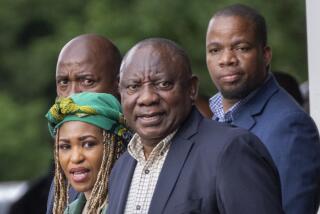Botha, Jailed Black Leader Mandela Meet
- Share via
JOHANNESBURG, South Africa — Jailed black nationalist leader Nelson R. Mandela and South African President Pieter W. Botha, aging leaders of the two strongest opposing forces in modern South African history, met face to face--apparently for the first time--last week in the presidential mansion, the government said Saturday.
The minister of justice, Kobie Coetsee, said the 45-minute chat Wednesday was a “courtesy visit” by Mandela to Botha, during which no policy matters were discussed or negotiations conducted. Coetsee, who was present, said the 73-year-old president and the 70-year-old inmate talked “in a pleasant spirit.”
It was the first publicly known meeting of the two men, and Coetsee said they both “availed themselves of the opportunity to confirm their support for peaceful development in South Africa.”
Groundwork for Release Seen
The meeting, coming in the twilight of Botha’s 11-year rule, was seen here as a further attempt by the government to demythologize Mandela and lay the groundwork for releasing him. Mandela, head of the outlawed guerrilla group, the African National Congress, is regarded by millions of black South Africans as their true leader.
Government sources have said that Mandela, who has served 26 years of a life sentence for sabotage, may be released after the Sept. 6 general elections--but not before, to avoid the risk of damage to the ruling National Party’s support among more conservative whites.
But the possibility remains that Botha, angered by the way his party tried to oust him earlier this year, could upstage his successor by freeing Mandela before relinquishing the presidency. Botha lost a bitter power struggle within his own party before agreeing to step down after the elections. If the ruling National Party wins the September parliamentary elections, as is widely expected, party chief Frederik W. de Klerk will become the new president.
De Klerk has promised to restart the apartheid reform program that had ground to a halt under Botha, and he has pledged to begin negotiations with unspecified black leaders on a power-sharing arrangement.
The government clearly hopes the Mandela-Botha meeting will improve its image overseas. Most leaders in the world have, at one time or another, called on South Africa to release Mandela, and Pretoria’s attempt to open negotiations with black leaders have been stymied by most black leaders’ refusal to meet with the government until Mandela is freed.
Sees Approval Abroad
A spokesman for Roelof F. (Pik) Botha, the minister of foreign affairs, said Saturday night that the meeting was “an important current development” in the nation that would “receive positive support abroad.”
Coetsee and others of Botha’s Cabinet ministers have met frequently over the years with Mandela, who has consistently refused government offers of conditional release.
Until last year, Botha had refused to consider Mandela’s release unless Mandela agreed to renounce violence. But Botha has softened his position on that in recent months, hinting that Mandela could be released if “he is prepared to contribute to a peaceful settlement of South Africa’s future.”
Mandela’s incarceration has for years created a dilemma for the government, which has said that releasing Mandela--or allowing him to die in prison--could touch off widespread rioting.
60-Mile Trip for Mandela
Mandela, who is being held in a three-bedroom house on the grounds of the Victor Verster prison farm, made the 60-mile trip to Botha’s official residence, Tuynhuys, in downtown Cape Town, apparently at Botha’s request. Mandela reportedly consulted African National Congress leaders outside the country, through intermediaries, before accepting the invitation.
Mandela’s attorney, Ismail Ayob, met Mandela on Saturday, only hours before the government announcement. Mandela did not mention the meeting with Botha, “but I have no reason to doubt it took place, at the state president’s request,” Ayob said in an interview.
Mandela, who will turn 71 in 10 days, has been in prison since 1962. A founder of the African National Congress’ military wing, he was convicted in 1964 of sabotage and plotting to overthrow the government’s white-minority rule. Mandela was moved to the prison farm last year from Pollsmoor Prison, after recovering from tuberculosis.
Many of the country’s 28 million blacks, who outnumber whites 4-to-1 but have no vote in national affairs, look on Mandela as an almost mythical figure, although the government for years tried to play down his importance.
In the past year, however, Botha has acknowledged that Mandela is a person the government must talk with about the country’s future. And the state-run television station, in leading its Saturday night newscast with the meeting, referred to Botha and Mandela as “the two leaders.”
More to Read
Sign up for Essential California
The most important California stories and recommendations in your inbox every morning.
You may occasionally receive promotional content from the Los Angeles Times.














